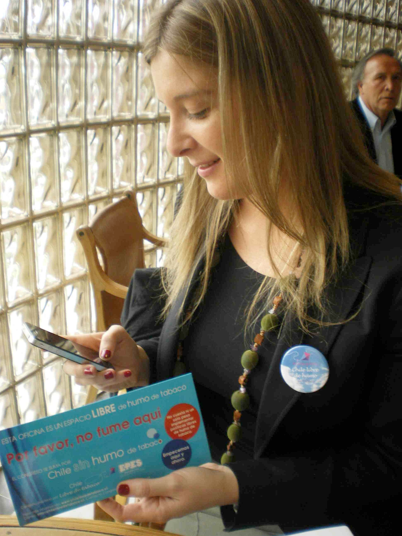How I learned to love Twitter: A media advocate’s story of success over Big Tobacco
by: Lezak Shallat
posted on Monday, July 01, 2013
Initiating an advocacy campaign with a new social media tool and mastering its unfamiliar terrain can be as disconcerting as moving to a different country. And I did both recently, when I employed Twitter to push legislators in Chile to enact the country’s new ban on cigarette advertising and indoor smoking … and then moved back to the U.S., after many years in Latin America, to join the BMSG team.
As a journalist based in Chile since the 1990s, I always worked closely with community groups and activist networks on a range of public health issues, including violence against women, HIV/AIDS and reproductive rights. Since women in Chile are among the heaviest smokers in the world, this meant spending untold hours in impassioned debate under clouds of cigarette smoke. Tobacco use was (and still is) the country’s leading cause of preventable death, but its ubiquity (and the astute machinations of the tobacco industry) had rendered it invisible — hidden in plain sight — with no solutions proffered to the public eye beyond individual choice nor any community or non-smoker voices raised in support of comprehensive tobacco control legislation.

In the halls of the Chilean Congress, Deputy Marcela Sabat dashes off a quick tweet to her 23,000 followers, pledging her support of tobacco law reform.
That realization placed me on a journey of skill-building and strategic communications that culminated on March 1, 2013, with the enactment of one of the world’s most advanced tobacco control laws. The efforts of our group, Chile Libre de Tabaco, (Tobacco Free Chile) and allies in government, academia and public health, give credence to Margaret Mead’s much-quoted maxim: “Never doubt that a small group of thoughtful, committed citizens can change the world; indeed, it’s the only thing that ever has.”
One of our most effective campaigns took place over Twitter, a channel we adopted despite our initial reluctance to give time and energy to yet one more online activity. Our turn-around came after a propitious encounter with Deputy Marcela Sabat, the youngest member of Congress, who we ran into in Congressional coffee bar. As we launched into our “elevator” speech, Marcela took our literature, donned our button, and tweeted her support of the law to 23,000 followers.
Signing up, for free, to Twitter and investing the time to search for our representatives’ “Twitter handles” gave us an immediate way to engage them in pithy exchanges and explicit endorsements, all conducted in the public realm, recorded in writing, and often adorned with a toothy campaign smile.
I don’t know if it is the novelty of Twitter or the tedium of Congressional debates, but Chile’s elected representatives attend their civic duties smart phone in hand, incessantly monitoring texts and tweets to intervene, defend, debate and test-run their arguments. This exchange spills over into evenings, weekends and holidays, as the lawmakers engage in non-stop fine-tuning of their positions based on immediate feedback in real time.
One of my favorite illustrations of how this worked for us took place last year on International Workers’ Day. To present smoke-free legislation as an issue of occupational health and labor rights (and not only customer choice), we piggy-backed on the holiday to distribute a series of compelling worker testimonies, sent via private letter to the Labor Minister, and then released to the media via press release, website, Facebook and Twitter.

I was on holiday but eagerly checking Twitter for reactions when one of our most adversarial senators responded, challenging the credibility of the testimonies. In a matter of clicks, I sent him, via Twitter, links to the research substantiating our campaign — to which he had no recourse but to respond, to us and his 35,000 followers: “I will have to study these materials.”
When, after many months, the final vote was imminent, our Twitter campaign — converted into screen grabs and splashed all over our website and Facebook — constituted a gallery of public pledges. Woe be unto the legislator who disavowed his or her word and voted against reforms: To do so was to merit unrelenting public censure from a persistent cadre of clean air militants.
“Is this the value of your word of honor? Is this how an honorable Senator acts?” one Twitter follower complained (in Spanish) to a certain Senator Kuschel, who voted in reverse of his public commitment.
Or as Deputy Jorge Burgos, a staunch opponent of smoke-free legislation, tweeted: “For those of you who’ve been pestering me to approve the tobacco law: I just bought 51% of Marlboro. I recuse myself.” The sardonic humor alludes to the matrix of vested interests that bind together Chile’s political and economics elites, and nowhere more so than in the tobacco industry, where several former ministers sit on the board of directors of the country’s quasi-monopoly cigarette manufacturer.
In media advocacy work, it’s never easy to identify any single action as responsible for communications and advocacy success. But identifying what communications channel your target is listening to and tailoring your strategy to make the best use of its characteristics will always reap fruits. Once we decided to embrace it, focused use of Twitter gave us an influential platform from which to name and praise, chide and shame, educate and hold accountable.
As I reacquaint myself with California after my long absence, I look forward to applying my experiences in public health advocacy closer to home, and, as the newest member of the BMSG team, sharing them with others.
Lezak Shallat joined BMSG in April, following the March 1 enactment of Chile’s new tobacco law. Last week, the World Lung Foundation and American Cancer Society chose Chile to launch the Spanish-language edition of its renowned Tobacco Atlas, in recognition of Chile’s efforts to tackle its tobacco epidemic, improve public health and curb the influence of the tobacco industry.



